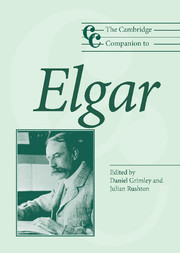Book contents
- Frontmatter
- 1 Introduction
- 2 Elgar and his British contemporaries
- 3 Elgar and his publishers
- 4 Magic by mosaic: some aspects of Elgar's compositional methods
- 5 Elgar's musical language: the shorter instrumental works
- 6 The early choral works
- 7 Elgar's later oratorios: Roman Catholicism, decadence and the Wagnerian dialectic of shame and grace
- 8 Roman Catholicism and being musically English: Elgar's church and organ music
- 9 ‘A smiling with a sigh’: the chamber music and works for strings
- 10 In search of the symphony: orchestral music to 1908
- 11 The later orchestral music (1910–34)
- 12 Elgar's unwumbling: the theatre music
- 13 Elgar and recording
- 14 Broadcasting's ally: Elgar and the BBC
- 15 Elgar in German criticism
- 16 Functional music: imperialism, the Great War, and Elgar as popular composer
- Notes
- Select bibliography
- Index
2 - Elgar and his British contemporaries
Published online by Cambridge University Press: 28 September 2011
- Frontmatter
- 1 Introduction
- 2 Elgar and his British contemporaries
- 3 Elgar and his publishers
- 4 Magic by mosaic: some aspects of Elgar's compositional methods
- 5 Elgar's musical language: the shorter instrumental works
- 6 The early choral works
- 7 Elgar's later oratorios: Roman Catholicism, decadence and the Wagnerian dialectic of shame and grace
- 8 Roman Catholicism and being musically English: Elgar's church and organ music
- 9 ‘A smiling with a sigh’: the chamber music and works for strings
- 10 In search of the symphony: orchestral music to 1908
- 11 The later orchestral music (1910–34)
- 12 Elgar's unwumbling: the theatre music
- 13 Elgar and recording
- 14 Broadcasting's ally: Elgar and the BBC
- 15 Elgar in German criticism
- 16 Functional music: imperialism, the Great War, and Elgar as popular composer
- Notes
- Select bibliography
- Index
Summary
Central to a popular understanding of Elgar's solitary, autodidactic world – one that accentuated his isolation from Britain's musical establishment – has been a narrative that heightened the significance of his roots in ‘trade’, his Roman Catholicism, his lack of a university education, his struggle for recognition (when others of lesser ability were apparently enjoying greater attention), and his own pejorative and often bitter remarks about the music of his native colleagues. Matters have not been assisted by the prejudicial assumptions of Shaw in 1920 who, through his hostility towards academia, chose to venerate Elgar at the expense of the ‘little clique of musicians, who, with the late Hubert Parry as its centre, stood for British music thirty-five years ago’. It was a statement refuted with some vigour by Elgar himself who clearly retained an admiration for Parry. Such polarised and entrenched views had taken root some time earlier. Ernest Walker, a descendant of the ‘Oxford School’ of criticism (which included Parry and Hadow), devoted an equal amount of space in his A History of English Music of 1907 to ‘the trio of composers [Parry, Stanford, Elgar] who stand by common consent at the head of modern English music’, and quietly denounced Elgar's ‘hot-house type of emotionalism’, his ‘forced pseudo-impressiveness’, and a tendency to allow colour to hide content. This was a view endorsed by Edward J. Dent, Professor of Music at Cambridge and a one-time Stanford pupil, whose cursory treatment of Elgar (in favour of Parry and Stanford) in his essay ‘Engländer’ for Guido Adler's Handbuch der Musikgeschichte in 1930 epitomised an academic scorn for Elgar's music.
- Type
- Chapter
- Information
- The Cambridge Companion to Elgar , pp. 15 - 23Publisher: Cambridge University PressPrint publication year: 2005



